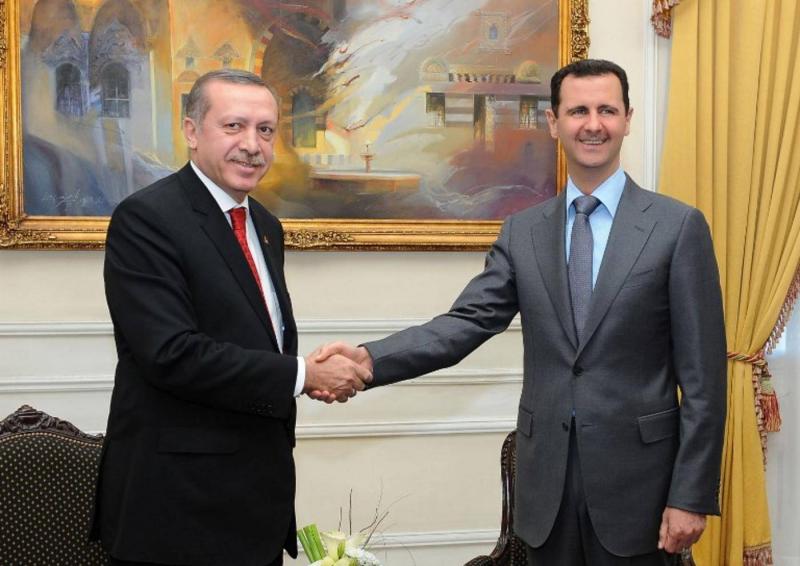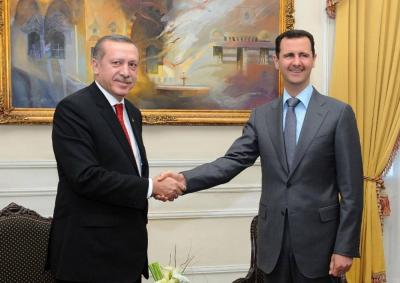Turkey has been striving to restore its relations with Syria after a rift that lasted nearly 13 years, following Ankara's support for the Syrian opposition after widespread protests in Syria in mid-March 2011, followed by military intervention and control over areas in the northwestern and eastern parts of its neighbor. Amid these rapprochement attempts, the future of the relationship remains uncertain, especially with a so-called "Turkish push" and "Syrian restraint," as it is known in media circles.
Turkish President Recep Tayyip Erdoğan has repeatedly expressed his desire to meet his Syrian counterpart, while President Bashar al-Assad has stated he has no objection to a meeting if it serves Syria's interests, stressing that he has not been presented with the objective of the initiative to date.
The article discusses the reasons behind this rift that followed a strong friendship. Syrian journalist Abdul Hamid Tofiq explained that to understand all the details of the Turkish-Syrian disagreement, one must look back to the beginning, noting that the relations between Syria and Turkey were not new but were strengthened when Bashar al-Assad took power.
Tofq pointed out that Erdoğan is in a predicament due to past decisions regarding the crisis in Syria, which has imposed burdens on Turkey that it can no longer bear today. He mentioned that Turkey has supported thousands of armed groups in northern Syria since 2011, where Erdoğan believed he could use them against the Syrian army to overthrow the regime in general and the Kurdish forces in particular.
Another burden placed on Turkey by Erdoğan was the situation in Idlib, where the presence of Hay'at Tahrir al-Sham, an arm of al-Qaeda in Syria, enabled Erdoğan to establish developmental projects in that area, including housing initiatives under the banner of "safe zone," believing he could repatriate refugees there as it was seen as a region outside the Syrian state's control in all senses: geographically, politically, and socially.
Demographic change initiatives followed, during which Erdoğan brought armed elements from all areas that were outside the control of the Syrian army, particularly those close to the Syrian capital, Damascus, which posed the greatest threat to the regime's survival then. This made Erdoğan eager to secure those deals, as those elements were from the Sunni sect, and their relocation to northern Syria would complete the composition, while Syrian authorities aimed to remove armed elements from surrounding the capital (Douma - Darayya - Jobar - Eastern Ghouta).
The Syrian objective was to gain a foothold in eastern Aleppo, which was indeed achieved.
Erdoğan referred to Assad as "the criminal," while Assad labeled Erdoğan as "the Turkish thief," in reference to the territories Turkey seized during its military operations in Syria. Today, Erdoğan seeks to restore relations between the two neighboring countries, having many goals, including finding common ground regarding the 3.6 million Syrian refugees in Turkey, preventing the establishment of a Kurdish state, and resuming trade and cooperation.
Tofq explained that Erdoğan is fighting to escape the predicament he faces with the domestic audience, which rejects the Syrian presence on one hand and his approach to the overall Syrian file on the other. He added that the Turkish push to restore relations with Syria is Erdoğan's last resort; if achieved, it would stimulate the stagnant Turkish economy, particularly in the last two years, since opening trade routes from Turkey to Syria and through to the Gulf and Asia represents a crucial economic lifeline.
Regarding the previous accusations and labels and whether it is possible to open a new chapter between the two parties, especially as Erdoğan previously described his Syrian counterpart as "the criminal" and Assad referred to him as "the Turkish thief," Tofiq confirmed that political agreements usually resolve any conflicts.
He continued by noting that the current negotiations between Turkey and Syria are being engineered by Russia, which has significant interests in this matter. Tofiq emphasized that a meeting would signal the beginning of a negotiation process, which would involve dedicated committees from both sides.
In this context, Tofiq noted that President Assad aims to break Syria's international isolation and shares Erdoğan's rejection of a Kurdish state, while stressing the need to end the Turkish presence entirely in the north. He mentioned that the restoration of relations is being maneuvered by Russia, as President Vladimir Putin has his objectives as well.
Putin desires to hold the meeting on his territory because it would constitute a historical milestone, especially if it could genuinely lead to a resolution of the protracted Syrian crisis. He affirmed that Russia has substantial goals in the Turkish-Syrian reconciliation, including claiming that Russia has reinforced a political solution in Syria following its decisive military role in 2015, returning the Syrian army to power and control.
Additionally, there is a potential for improving ties with Turkey based on mutual economic interests, particularly concerning Russian liquefied natural gas, which is being stationed in Turkey for supply to Europe, benefiting Turkey significantly. Moreover, advancing relations with Syria could facilitate Turkey's role in resolving the Russian-Ukrainian conflict, given Turkey's NATO membership and its influence in voting.
Nevertheless, there are also political benefits for Russia, including causing a rift in Turkish-American relations and exploiting Turkey's challenging economic circumstances.
Tofq outlined the challenges ahead:
1. He affirmed that negotiations to restore Turkish-Syrian relations could indeed happen, but if they do, under certain agreements, their outcomes would take years to manifest on the ground. He explained that Syria's primary condition is the withdrawal of Turkish forces from northern territories to commence any dialogue, stressing that implementation would only occur with Syrian-Russian-Turkish consensus. If achieved, this would come at the expense of tens of thousands of armed elements in the north, leading to the gradual dissolution of the Nusra Front's presence.
2. The second challenge lies in the dilemma of the Kurds, who are supported by the Americans, with the presence of these armed elements in Syria’s resource-rich regions (wheat, oil, gas, and cotton) complicating matters, particularly as American protection makes them a difficult challenge. Tofiq noted that Assad has never fought the Kurds nor supported them; instead, he has maintained pragmatic communication for oil exchanges. He emphasized that the Kurdish issue can only be resolved through agreement with Damascus, especially since it is fundamentally a Turkish problem managed by Syria.
3. The third challenge is the refugee situation; the overall economic condition in Turkey can no longer sustain the refugees, who have become a significant obstacle in negotiations. Tofiq pointed out that resolution is more complex than one might think, as reintegration is incredibly challenging. He questioned how Syrian refugees in Turkey could return without homes, referring to the destruction of their homes due to war and military operations. Furthermore, the economic crisis in Syria rendering it unfit for new challenges complicates matters further.
In conclusion, he emphasized that rebuilding relations between Syria and Turkey is very difficult due to the surrounding circumstances, the data, and the facts resulting from 13 years of Turkish policies based on disconnection and war. He noted that a window of hope may open under one condition: the emergence of serious, unified international Arab cooperation to reach an agreement on a concrete roadmap for the post-rift phase and clarify steps for normalized relations.
It is worth noting that since the beginning of the Syrian conflict in 2011, Ankara has provided essential support for the political and military opposition and has launched three significant military operations in Syria since 2016, primarily targeting Kurdish fighters. It has managed to control a vast border area in northern Syria with the help of allied Syrian factions, while Damascus requires full Turkish withdrawal to engage in any negotiations. Nevertheless, recent weeks have seen significant developments in this file, as the Turkish president has repeatedly invited his Syrian counterpart for a visit, while the latter has indicated his willingness to restore relations but has called for more details regarding the objectives.




